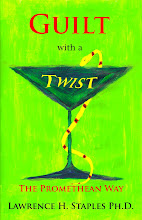How Guilt Creates and Sustains the Opposites and Consciousness
Consciousness depends upon the existence of opposites. If there were only cold and no hot, only black and no white, only up and no down, half of life as we know it would not exist. Conscious life would be so greatly diminished that our existence at best would be a twilight one.
We don’t have to go far to see guilt’s effect on the creation and maintenance of the opposites and, in turn, consciousness. Simple examples abound in our daily lives that illustrate this phenomenon. In these examples, we see how guilt makes us aware of an opposite that may have lain dormant or unconscious, often briefly, sometimes, for years. The purpose of the guilt is to make us conscious of the dormant opposite and to modify our thinking and/or behavior to reflect it.
A forty -year old patient had accomplished little in his life. He had bounced from job to job and had worked way below his potential. He had smoked pot daily since he was 16. He spent much time and energy on computer games and hanging out with friends. He was depressed and felt much guilt about his failure to achieve, despite some grandiose fantasies of doing so. After about a year of analysis and work on the guilt he did give up pot and began to be more industrious and active. He began to make progress in his work. We can see that qualities of industry and activity had been dormant or unconscious in him for years. Laziness and passivity had dominated his life. But guilt worked on him daily and it was guilt that waked up the dormant opposite and brought it into conscious awareness so that he could use it in his life. On the other hand, a workaholic and high achiever might feel guilty about his neglect of family, friends, and even health and feel guilt that awakens his passive pole and tries to move him toward it.
We also see guilt’s effect in the widespread experience of breaking one’s diet and gorging. The gorging is always followed by powerful feelings of guilt. Loss of control in many areas of life, whether it be eating or drinking or anger, constellates guilt that nudges us toward the opposite, toward discipline and control.
Still another example is inappropriate responses. Whenever we have responded in a way that feels inappropriate, we feel guilty, perhaps about our lack of restraint. However, we might just as easily have felt guilty about a lack of spontaneity in the very same situation. The guilt is attempting to awaken the opposite and nudge us toward it.
